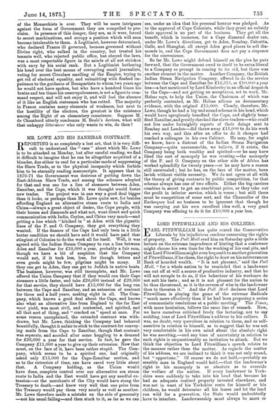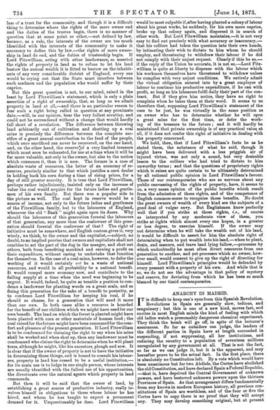LORD FITZWELLIAM AND HIS COLLIERS.
AR L FITZWILLIAM has quite scared the Conservative
Liberals by his injudicious candour concerning the rights of property. The Pall Mall read him on Saturday quite a little lecture on the extreme imprudence of hinting that a coalowner might choose his own time for the working of his coal pits, and that Lord Fitz william might even bequeath to another generation of Fitzwilliams, if he chose, the right to draw on his subterranean Bank of hoarded wealth. "It is not pleasant," said the Pall Mall, "for a whole nation to be reminded that a landowner can cut off at will a source of productive industry, and that he will not scruple to do so, if the behaviour of his workmen do not suit his taste ; and as it is not pleasant for the nation to be thus threatened, so it is the reverse of wise in the landowner thus to threaten it." And the Pall Mall declares that Lord Fitzwilliam is playing the game of the extreme Radicals "much more effectively than if he had been proposing a series of communistic resolutions at a public meeting." The Times, with more hesitation, follows the same line of remark. Now, we have ourselves criticised freely the lecturing, not to say scolding, tone of Lord Fitzwilliam's address to his colliers. It was, no doubt, very querulous in relation to them, and so self- assertive in relation to himself, as to suggest that he was not very comfortable in his own mind about the absolute right he was asserting,—and any tone of uncertainty in relation to such rights is unquestionably an invitation to attack. But we think the objection to Lord Fitzwilliam's speech relates to the manner rather than the matter. As regards the matter of his address, we are inclined to think it was not only sound, but "opportune." Of course we do not hold,—probably no sensible man in England would hold,—that the landowner's right in his monopoly is so absolute as to override the welfare of the nation. If every landowner in York- shire were suddenly to take into his head that because he had an adequate realised property invested elsewhere, and was not in want of his Yorkshire rents for himself or his children, he would determine all his leases and let the land run wild for a generation, the State would undoubtedly have to interfere. Landownership must always be more or
less of a trust for the community, and though it is a difficult thing to determine where the rights of the mere owner end and the duties of the trustee begin, there is no manner of question that at some point or other,—not defined by law, because, as a rule, the interests of the owner are too much identified with the interests of the community to make it necessary to define this by law,—the rights of mere owner- ship in land do end, and the duties of trusteeship begin. If Lord Fitzwilliam, acting with other landowners, so asserted the rights of property in land as to refuse to let his land bestow the annual wealth it is fitted to bestow on the inhabit- ants of any very considerable district of England, every one would be crying out that the State must interfere between such madmen and the population who would suffer by their caprice.
But this great question is not, to our mind, raised in the least by Lord Fitzwilliam's statement, which is only a plain assertion of a right of ownership, that, so long as we admit property in land at all,—and there is no particular reason to fear such a right being called in question at any proximate date,—will, in our opinion, bear the very fullest scrutiny, and could not be surrendered without a change that would hardly fall short of a revolution. The difference between throwing land arbitrarily out of cultivation and shutting up a coal mine is precisely the difference between the complete sac- rifice of a great annual contribution to the food of the people, -which once sacrificed can never be recovered, on the one hand, and, on the other hand, the reserve:of a very limited treasure which must soon be exhausted, for use at a time when it will be far more valuable, not only to the owner, but also to the nation which consumes it, than it is now. The former is a case of absolute waste of resources, the latter of an economy of re- sources, precisely similar to that which justifies a corn dealer in holding back his corn during a time of rising prices, for a day of still greater scarcity. It is true that Lord Fitzwilliam, perhaps rather injudiciously, insisted only on the increase of -value the coal would acquire for the future ladies and gentle- men of his own family. But there was a popular side to the picture as well. The coal kept in reserve would be a source of income, not only to the future ladies and gentlemen AA the Fitzwilliam family, but to the labourers of England, whenever the old " Bank " might again open its doors. Why should the labourers of this generation forestal the labourers of that generation, any more than the coalowner of this gene- ration should forestal the coalowner of that ? The right of initiative must be somewhere, and English custom gives it, very wisely, we think, to the owner and the capitalist, —subject, no doubt, to an implied proviso that owners and capitalists shall not combine to act the part of the dog in the manger, and shut out others, both from benefiting mankind and earning a profit on their expenditure, without caring to undertake that function for themselves. In the case of a coal-mine, however, to defer the working of it would certainly not be a waste of national resources, and would in all probability be a national benefit. It would compel more economy now, and contribute to the failing supply at a time when the need was beginning to be urgent It would, indeed, be quite as tenable a position to con- demn a landowner for planting woods on a great scale, and so fining this generation for the sake of a benefit to posterity, as to condemn Lord Fitzwilliam for keeping his coal, if he should so choose, for a generation that will need it more than our own. In both cases alike a resource is hoarded for the benefit of our children which we might have used for our own benefit. The land on which the forest is planted might have been planted with corn or other materials of human food ; the coal raised for the future might have been consumed for the com- fort and pleasure of the present generation. If Lord Fitzwilliam is to be condemned for claiming the right to say when his mine shall be worked and when shut up, then any landowner must be -condemned who claims the right to determine when he will plant trees, although he might, like his ancestors, plough and sow. It is clear that if the owner of property is not to have the initiative in determining these things, and is bound to consult his labour- ers, property in land has ceased to be a useful institution,— for its main use is to lodge in one single person, whose interests are usually identified with the fullest use of his opportunities, the directorate over the natural agents which property in land commands.
But then it will be said that the owner of land, by establishing a great source of productive industry, really in- volves himself in obligations to those whose labour he has hired, and whom he has taught to expect a permanent demand for it. Unquestionably he does. Lord Fitzwilliam would be most culpable if, after having planted a colony of labour about his great works, he suddenly, for his own mere caprice, broke up that colony again, and dispersed it in search of other work. But Lord Fitzwilliam maintains,—it is not very easy to find out precisely with what accuracy or inaccuracy,— that his colliers had taken the question into their own hands, by intimating their wish to dictate to him whom he should employ, and threatening to withdraw their labour if he did not comply with their unjust request. Clearly if this be so,— if the reply of the Union be accurate, it is not so,—Lord Fitz- william is quite at liberty to dispense with the labour which his workmen themselves have threatened to withdraw unless he complies with very unjust conditions. We entirely admit the virtual obligation entered into by a great employer of labour to continue his productive expenditure, if he can with profit, so long as his labourers fulfil daily their'part of the con- tract. But if they give him notice, they have no right to complain when he takes them at their word. It seems to us_ therefore that, supposing Lord Fitzwilliam's statement of the case to be just, he was virtually in the same position as an owner who has to determine whether he will open a great mine for the first time, or defer the work- ing of the treasure to the future ; and it will hardly be maintained that private ownership is of any practical valua at all, if it does not confer this right of initiative in dealing with the property concerned.
We hold, then, that if Lord Fitzwilliam's facts be as he stated them, the substance of what he said, though it might have been delivered with a less priggish air of injured virtue, was not only a sound, but very desirable lesson to the colliers who had tried to dictate to him unworthy terms ; and that the questions of proprietary rights which it raises are quite certain to be ultimately determined by all rational public opinion in Lord Fitzwilliam's favour. Those of our contemporaries who are so nervous about any public canvassing of the rights of property, have, it seems to us, a very mean opinion of the public benefits which result from the admission of those rights, and of the competence of English common-sense to recognise those benefits. No doubt the great owners of wealth of every kind are the subjects of a good deal of vulgar envy. But Englishmen know perfectly well that if you strike at these rights, i.e., of course as interpreted by any moderate view of them, you strike at rights which almost every one hopes, in a greater or less degree, to exercise himself. If the owner may not determine when he will take the wealth out of his land, it would be difficult to assert for him the absolute right of determining when to put wealth into his land,—when to plant, drain, and manure, and leave land lying fallow,—processes by which undoubtedly he must often divert resources from one generation to another, and yet processes which no owner, how- ever small, would consent to give up the right of directing for himself. Lord Fitzwilliam's principles would be defended by every peasant with a property of his own. And while that is so, we do not see the advantage in that policy of mystery and reserve, for deviating from which he has been so much blamed by our timid contemporaries.



































 Previous page
Previous page